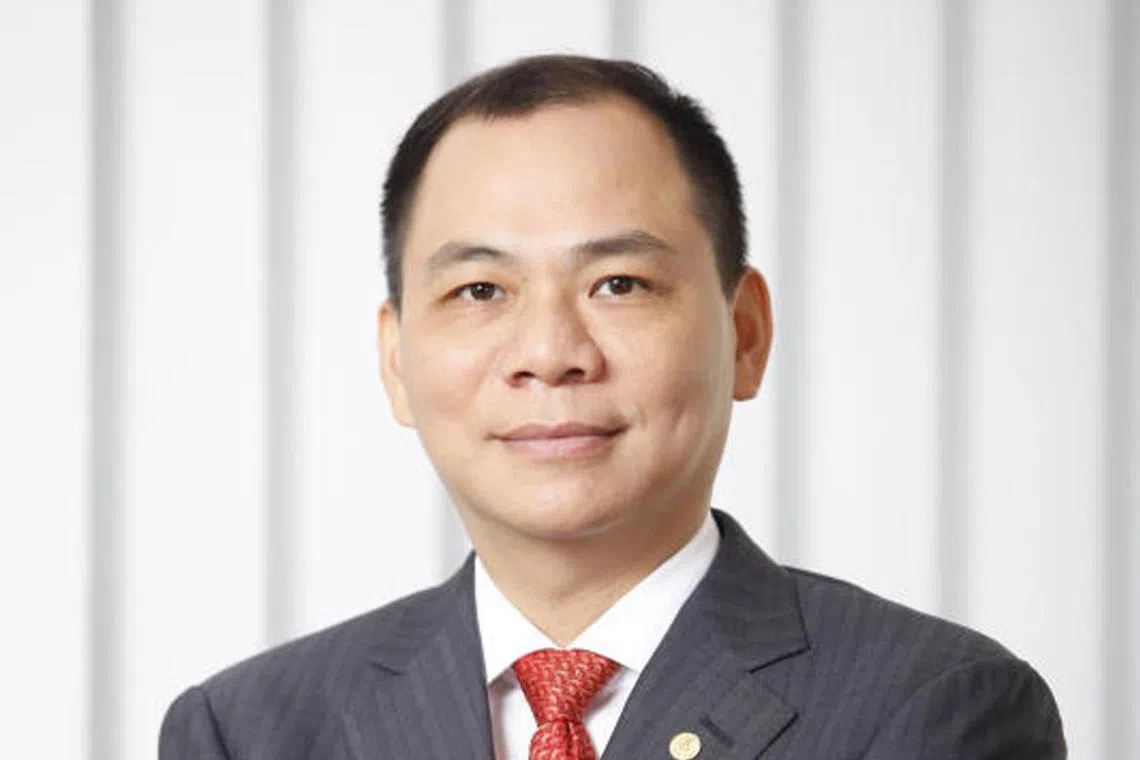Richest man in Vietnam doubles down on risky $10.9 billion wager on EVs
Sign up now: Get ST's newsletters delivered to your inbox

Billionaire Pham Nhat Vuong's electric vehicle maker VinFast has delayed plans to list in the US.
PHOTO: VIET NAM NEWS/ ASIA NEWS NETWORK
Singapore – It is a familiar story: a business mogul parlaying much of his fortune into a massive bet on electric vehicles (EVs), only to fall on hard times.
Billionaire Pham Nhat Vuong is among the latest to take after Mr Elon Musk, who made it through what he famously described as Tesla’s “production hell”. Others include Mr James Dyson, the household appliance billionaire; Mr Jia Yueting, founder of the Netflix of China; and Mr Hui Ka Yan, the embattled property tycoon behind China Evergrande Group.
The odds that any of these players will ride out the inferno as Tesla did are looking increasingly long. Mr Dyson pulled the plug on his EV venture in 2019.
Mr Vuong’s difficulties are proving costly. VinFast, his carmaker that filed for an initial public offering (IPO) a year ago,
The return on all that investment has been meagre: VinFast sold just 93,000 vehicles and 162,000 e-scooters.
Mr Vuong has only doubled down, lining up another US$2.5 billion for VinFast, US$1 billion of which will come from him personally. This month, the company plans to start delivering longer-range versions of its VF 8 sport utility vehicles to US customers.
What is still unclear is how quickly those SUVs will catch on in what is an increasingly cut-throat EV market, with Tesla slashing prices and putting pressure on incumbents that have been around more than a century. VinFast will need to spend heavily to familiarise Americans with its brand and set up networks for distribution and retailing vehicles.
“Can VinFast run a marathon and sacrifice the short term for the long term?” asks Dr Alexander Vuving, a professor who specialises in power politics and Vietnam at the Honolulu-based Asia-Pacific Centre for Security Studies. He said it is likely that the company will need deep pockets to sustain losses for many years.
Representatives for Vingroup declined to comment on Mr Vuong’s plans beyond the company’s statement last month saying he would redouble his funding commitments to VinFast.
Noodle beginnings
Mr Vuong, 54, is Vietnam’s richest man, with a net worth of US$3.9 billion, according to the Bloomberg Billionaires Index. He started his own business while studying in Moscow and has said he left Russia with US$40,000 in debt. He set up a dried foods company in Ukraine in the early 1990s that sold instant noodles and mashed potatoes, and sold it to Nestle for an undisclosed sum in 2010.
Soon after starting VinFast, Mr Vuong spoke openly about his ambition to sell cars in the US and his willingness to spend as much as US$2 billion of his fortune towards achieving that goal.
VinFast made many headlines last year, starting with its announcement in January that it would cease making petrol-powered cars. In March, US President Joe Biden praised its plans to build a US$4 billion EV factory in North Carolina. The following month, it filed confidentially for an IPO.
But there was trouble brewing at the top of the company around this time. Mr Michael Lohscheller, a veteran automobile executive hired away from leading German carmaker Opel, lasted only a matter of months as VinFast’s global chief executive officer.
Weeks after its confidential filing, Mr Vuong said during a Vingroup shareholder meeting that VinFast might delay the IPO until 2023, citing supply chain issues and market uncertainties. The parent company, nonetheless, hosted reporters from Bloomberg and other outlets for tours of its car factory in Haiphong, north of Hanoi.
Mixed reviews
The reviews were mixed. A writer for the blog Jalopnik called VinFast’s SUV “simply not ready for America”. Car And Driver magazine referred to some “quirks” – the accelerator was jumpy in one vehicle and laggy in another – while acknowledging that these may have just been “prototype pains”.
VinFast ploughed ahead, staging a ceremony in November at a port in Haiphong for the first 999 EVs it shipped to California.
VinFast’s plans for first deliveries to customers slipped from late December to January, then to February. Late that month, the company announced that it would slash initial lease customers’ monthly payments in half, charging US$399 a month. It finally handed over its first 45 SUVs to customers in California on March 1 and now has 310 vehicles on US roads, with another 100 due for delivery soon.
Time and money
While Mr Biden gave VinFast a small boost with his shout-out of the company’s US factory plans, his landmark climate Bill was somewhat of a setback.
“The Inflation Reduction Act really puts a lot of pressure on (VinFast) because it undermines its cost and price advantage that it probably wanted to have until it can have manufacturing here, which is incredibly expensive,” said Mr Mike Ramsey, a car analyst for consultancy Gartner. “It did get kneecapped by the IRA, but it also got kneecapped by the reality of trying to pull off an expansion in a far-flung market.”
Setting up networks for distribution, replacement parts and service will be no easy tasks, and without them, consumers will not have peace of mind that their vehicles can be repaired, said Mr Steve Man, a Hong Kong-based automotive analyst for Bloomberg Intelligence.
“I believe its lofty goals are achievable,” Mr Man said. “But it will take time and a lot of capital.” BLOOMBERG


